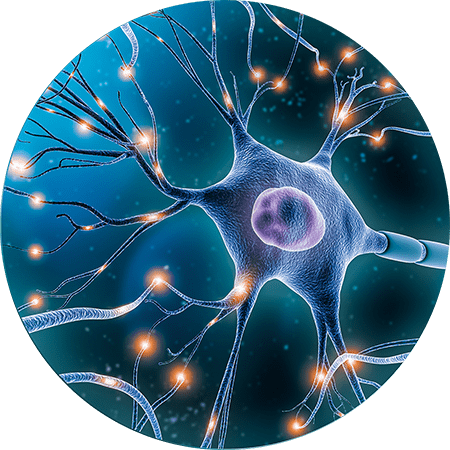
Rare Neurological Disorders
Committed to rare neurological disease research
Creating treatments and executing complex clinical trials for rare neurological disorders requires the expertise and support of an experienced team with a broad range of skills. It’s important to partner with a contract research organization (CRO) that enables you to manage the challenges of treating rare neurological diseases with specialized and flexible development strategies that incorporate rigorous feasibility assessment, robust training, and supportive site-network relationships with patient advocacy group collaboration and concierge services.
Prioritizing the patient experience is key to achieving your rare neurological trial’s goals. Adopting a patient-centric approach keeps the patients’ needs top of mind and proactively helps them navigate the complexities of participating in clinical trials. Not only does this approach help with recruitment and increase retention in trials — it also ensures that the humanity of every patient is prioritized during a difficult time in their lives. Prioritize the patient experience of your clinical trial with our customizable patient concierge offerings.
Accelerate your gene therapy trial
Gene therapies are changing outcomes for rare neurological diseases. We create streamlined gene therapy study protocols and designs to help you meet your goals effectively.
Move your trial forward
Finding a cure for patients living with rare neurological disorders like amyotrophic lateral sclerosis (ALS) and Duchenne muscular dystrophy is crucial to you, and we share your determination. Despite the many complexities inherent in developing treatments for these and other related conditions, these trials are an opportunity to transform the lives of millions of patients. Together, we ensure your clinical trial is conscientious of the necessities of patient care and also meets rigorous global standards that are appropriate for a dispersed trial population.
- 100+ rare neurological trials in the past five years
- Expertise in children’s disorders from our
Rare Disease and Pediatric Center of Excellence - Gene therapy experience
- Indication-specific site partnerships
- Proven solutions to recruit and retain patients
- Global regulatory expertise
Rare neurological disorders and indications expertise
When it comes to finding treatments for rare neurological disorders, experience matters. Our experienced team has partnered with drug developers to develop treatments and execute clinical trials for a wide array of neurological indications including rare genetic conditions. Some of these brain disorders include:
- Amyotrophic lateral sclerosis (ALS)
- Angelman syndrome
- Batten
- Cerebral palsy
- Cerebral cavernous malformations
- Cervical dystonia
- Chronic inflammatory demyelinating
polyneuropathy - Dravet syndrome
- Duchenne muscular dystrophy
- Epileptic encephalopathies
- Fabry disease
- Facioscapulohumeral muscular dystrophy
- Frontotemporal dementia
- Fragile X syndrome
- Gangliosidosis GM2
- Gaucher disease
- Huntington’s disease
- Lennox-Gastaut syndrome
- Lysosomal acid lipase deficiency
- Metachromatic leukodystrophy
- Mitochondrial disease
- Mucopolysaccaridosis (I-III)
- Myasthenia gravis
- Multiple systems atrophy
- Neuromyelitis optica
- Prader-Willi
- Spinocerebellar ataxia
- Tardive dyskinesia
Ending neuromuscular disorders
Bringing freedom and independence to neuromuscular patients is the ultimate goal. Accelerate your rare neuromuscular program with our experience across treating rare diseases, developing gene therapies and directing neuromuscular trials.
Expertise in the unique and novel aspects of rare neurological research
As the pipeline of new treatments for rare brain disorders expands, leverage our expertise in understanding these complex disorders, meeting regulatory requirements, and measuring what is important to patients and families. This experience includes:
- Expertise in operations for and medical development of gene therapies
- First-in-human single-ascending-dose (SAD) trials in Phase Ib/IIa through Phase IV
- Natural history, registry and endpoint development and analysis
- Complex studies with multiple vendor requirements including biopsies, clinical outcome assessments (COAs), labs, biolabs, physiotherapies and MRIs
Keep humanity at the center of the trial through patient advocacy
It’s important to ensure services are designed to make it easier for those affected by disorders of the central nervous system to handle the intricacies of participating and staying in clinical trials. By assigning a concierge to each participant at an early stage, each patient is able to receive consistent and proactive support that reduces individual burden as they navigate the complexities of being a clinical trial participant.
Tailored patient and caregiver engagement services include:
- Full-service booking and coordination of patient transportation to and from study sites and travel expense verification
- Flexible options for patient reimbursement in more than 150 currencies
- Home health care options, including partnering with remote staff
- Connection to flexible protocols for digital and decentralized trials and hybrid approaches using mobile pages, wearables, telehealth and e-consent



